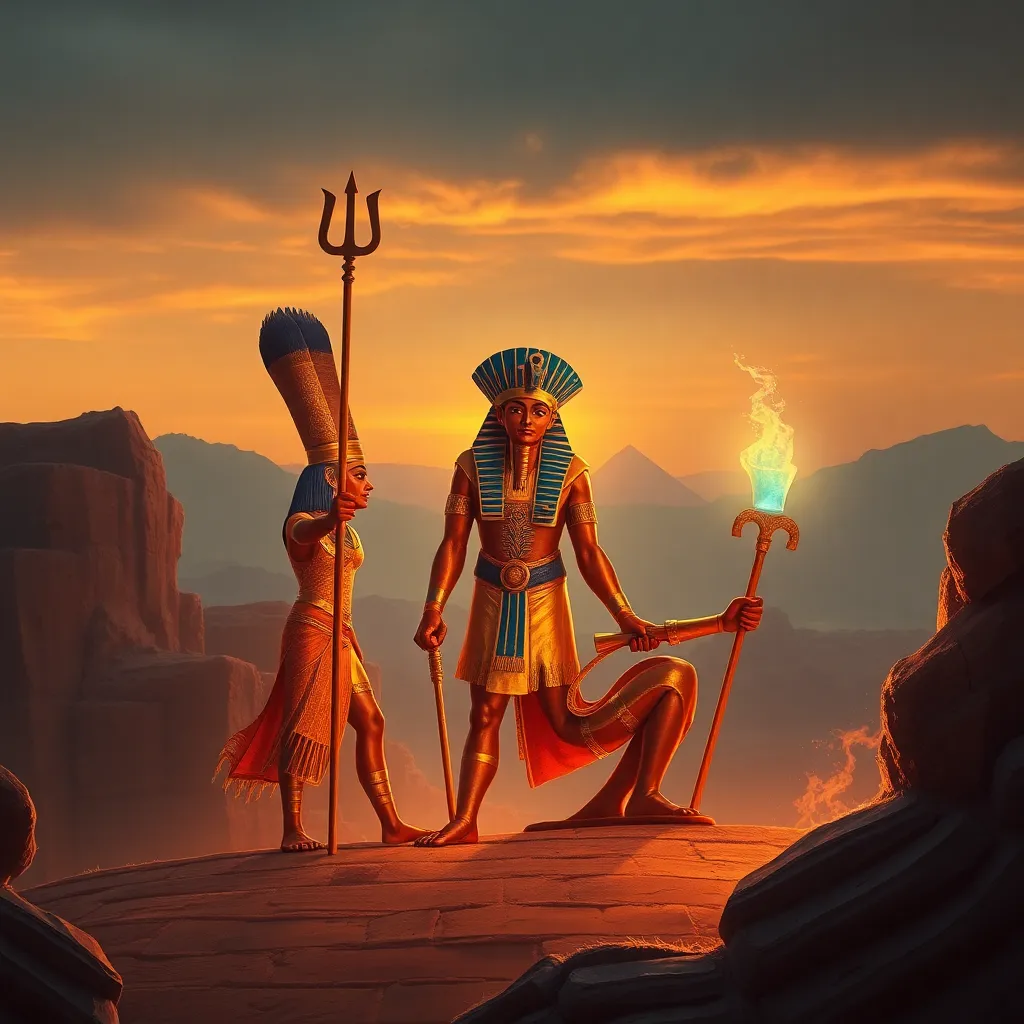The Connection Between Heka and the God Horus
I. Introduction
In ancient Egyptian belief, Heka embodies the concept of magic and power, serving as both a deity and a force that permeates the fabric of existence. Heka is often considered the divine personification of magic, essential for creation and the maintenance of the universe.
Horus, a prominent figure in Egyptian mythology, is revered as the sky god and protector of the land of Egypt. His significance extends beyond mere mythology; he symbolizes kingship, power, and the pharaoh’s divine right to rule. This article explores the intricate relationship between Heka and Horus, shedding light on their interconnected roles within ancient Egyptian belief systems.
II. Understanding Heka: The Concept of Magic and Power
The term “Heka” derives from the ancient Egyptian language, where it signifies both magic and the deity who governs it. Heka represents the magical power that was believed to be inherent in the world and accessible to both gods and humans.
Heka played a vital role in various aspects of daily life and religious practices. Egyptians invoked Heka through rituals, spells, and incantations to achieve various goals, such as healing, protection, and fertility. This power was not merely seen as a tool but as a divine essence that could influence both the physical and spiritual realms.
As a divine force, Heka is often associated with creation. It is said that he was present at the dawn of time, aiding in the formation of the world and the establishment of order out of chaos.
III. The Mythological Significance of Horus
Horus is one of the most important deities in ancient Egyptian mythology, often depicted as a falcon or a man with a falcon head. He is revered as the sky god, representing the sun and the moon, and is considered the protector of the pharaoh and the nation of Egypt.
Horus exists in various forms, including Horus the Elder, associated with the sky, and Horus the Younger, who is often linked to the concept of resurrection and rebirth. The different manifestations of Horus illustrate his multifaceted nature and the depth of his significance within the pantheon.
Symbolically, the falcon represents swiftness and keen vision, while the Eye of Horus, or the “Wedjat,” symbolizes protection, health, and restoration. This iconic symbol is often used in jewelry and amulets to provide safety and ward off evil.
IV. Heka and Horus: Shared Attributes and Symbolism
Heka and Horus share several attributes that highlight their connection. Heka, as a deity of magic, complements Horus’s role as a protector. Both embody themes of protection, healing, and royal authority, making them vital to the Egyptian worldview.
In the myths surrounding Horus’s battles, Heka is often invoked as a source of strength and support. The magical prowess of Heka aids Horus in his struggles, particularly during his conflicts with Set, the god of chaos and disorder.
V. Heka in Horus’ Birth and Ascendancy
The conception and birth of Horus are steeped in magical elements, with Heka playing a pivotal role. According to the myths, Heka’s influence was crucial in the magical conception initiated by Isis, Horus’s mother, after the death of Osiris.
During Horus’s struggle against Set, Heka’s magical powers were indispensable. Heka provided Horus with the strength needed to reclaim his rightful place as the ruler of Egypt, showcasing the synergy between the two deities.
Ultimately, Heka’s contributions were significant in Horus’s ascension to kingship, symbolizing the triumph of order over chaos and the establishment of divine authority.
VI. Rituals and Practices Involving Heka and Horus
Ancient Egyptians performed various rituals invoking both Heka and Horus to ensure protection and blessings. These rituals often included offerings, prayers, and the recitation of spells that appealed to both deities.
Spells and incantations were integral to the worship of Horus, with many being specifically designed to invoke Heka’s magical power. These spells were believed to harness Heka’s strength to protect individuals, heal ailments, or bring about favorable outcomes.
Artifacts and inscriptions from ancient Egypt often depict the relationship between Heka and Horus. For instance, amulets featuring the Eye of Horus are frequently accompanied by symbols representing Heka, illustrating their intertwined significance in both life and death.
VII. Legacy of Heka and Horus in Modern Interpretations
The legacy of Heka and Horus transcends ancient Egypt, influencing contemporary spirituality and neopagan practices. Many modern practitioners draw upon the symbolism and attributes of both deities in their rituals and spiritual frameworks.
Heka and Horus have also left a lasting imprint on literature, art, and popular culture. Their stories continue to inspire various forms of creative expression, from novels to films, where themes of magic, power, and the struggle between good and evil are prevalent.
Academic studies have explored the connection between Heka and Horus, shedding light on their roles within ancient Egyptian society and their relevance in understanding the broader context of Egyptian mythology.
VIII. Conclusion
The relationship between Heka and Horus is a testament to the rich tapestry of ancient Egyptian mythology, where magic and divinity intricately intertwine. Heka’s magical prowess and Horus’s role as protector and king highlight the profound connections that define ancient Egyptian culture.
The enduring impact of their connection can be seen in various aspects of modern spiritual practices and cultural representations. The relevance of Heka and Horus today serves as a reminder of the timeless themes of power, protection, and the quest for order amidst chaos.
In conclusion, the exploration of Heka and Horus not only deepens our understanding of ancient Egyptian beliefs but also enriches our appreciation for the mythological narratives that continue to resonate through time.




